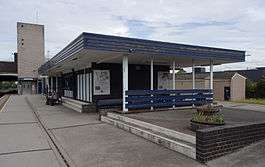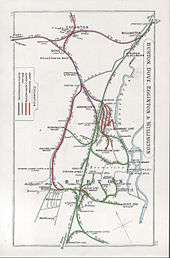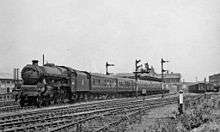Burton-on-Trent railway station
| Burton-on-Trent | |
|---|---|
 | |
| Location | |
| Place | Burton upon Trent |
| Local authority | East Staffordshire |
| Grid reference | SK242232 |
| Operations | |
| Station code | BUT |
| Managed by | East Midlands Trains |
| Number of platforms | 2 |
| DfT category | D |
|
Live arrivals/departures, station information and onward connections from National Rail Enquiries | |
| Annual rail passenger usage* | |
| 2010/11 |
|
| 2011/12 |
|
| 2012/13 |
|
| 2013/14 |
|
| 2014/15 |
|
| National Rail – UK railway stations | |
| * Annual estimated passenger usage based on sales of tickets in stated financial year(s) which end or originate at Burton-on-Trent from Office of Rail and Road statistics. Methodology may vary year on year. | |
|
| |
Burton-on-Trent railway station is in the town of Burton-upon-Trent, Staffordshire, England.
History




The original station was opened in 1839 by the Birmingham and Derby Junction Railway on its original route from Derby to Hampton-in-Arden meeting the London and Birmingham Railway for London.
In 1881 the old station was demolished and a temporary island platform constructed. A new station was constructed 150 yards further south and separated from the roadway on the bridge by iron palisading. There was a large covered cab-stand, which offered access to the booking hall, 65ft wide, 27 ft deep and 35ft high in "early English style, partly timbered. The stairs provided access to the island platform on which were built waiting rooms for ladies and gentlemen, and a first-class refreshment and dining room and a third-class refreshment room. The platforms were covered with a glass canopy and extended close to one quarter of a mile in length. The station was designed by the company architect John Holloway Sanders and erected by Messrs Cox of Leicester. The bridge was constructed under the supervision of the company engineer, Mr. Campion.[1] The new station re-opened in 1883.
The station was rebuilt yet again in 1971. The station, the railway sheds and the town's popular trainspotting locations feature significantly in the autobiographical book, Platform Souls by local author Nicholas Whittaker. Until the 1960s the station also served as the terminus for a number of secondary routes, such as the South Staffordshire Line to Lichfield City, the Leicester to Burton upon Trent Line to Leicester via Coalville Town and to Tutbury and Hatton. These all closed to passenger traffic between 1960 and 1965.
As a centre for beer brewing, Burton generated a great deal of freight traffic. In fact Burton itself was criss-crossed by the lines of the brewery companies' private lines, with a plethora of level crossings. In 1870 a new locomotive shed was built to the south of the station. This consisted of a roundhouse built round a 42-foot (13 m) turntable. In 1892 another roundhouse was added, with a 50-foot (15 m) turntable. In 1923 these were replaced by 57-foot (17 m) and 55-foot (17 m) turntables respectively. Originally coded "2" by the Midland Railway, it became 17B in 1935. By 1948 it had 111 locomotives allocated to it. With the arrival of diesel locomotives, a reorganisation of motive power districts in the London Midland Region took place in September 1963.[2] Under this, the former Nottingham (16), Derby (17) and Toton (18) divisions were amalgamated, with Toton as the main shed for the division; this was coded 16A,[2] and Burton-on-Trent became 16F.[3] Steam traction was removed from this depot in September 1966,[3] and it closed in 1968.
During the summer and autumn of 2011, the station underwent a £700,000 refurbishment, including removal of asbestos, improved disabled facilities, improved lighting and refurbished waiting room.[4]
Facilities
Access to the station is from the bridge on Borough Road that crosses the railway line. At road level, there is a small car park, a taxi rank/shop and the entrance to the station, which contains the ticket office. In order to reach the two platforms (Platform One is for Derby, Nottingham, London and the North, Platform Two is for Tamworth, Birmingham and the South), passengers descend a broad staircase, one of the few remaining parts of the old station, which was mostly demolished in the early 1970s.
Only a single building now stands at platform level (Burton is an island station, where the tracks run around a single platform), and this building incorporates a waiting room, toilets and a despatcher's office. Timetable information is available from destination boards and real-time customer information screens with automated train announcements.
The station has the PlusBus scheme where train and bus tickets can be bought together at a saving.
Services
The station lies on the Cross Country Route, between Derby and Birmingham.
| Preceding station | |
Following station | ||
|---|---|---|---|---|
| Tamworth | CrossCountry Cross Country Route |
Willington | ||
| Derby | ||||
The station's operator is East Midlands Trains, but no East Midlands Trains trains call there. All services are provided by CrossCountry, with trains between Cardiff Central, Birmingham, and Nottingham, as well as longer-distance services to destinations such as Bristol Temple Meads, Plymouth, Leeds, Newcastle and Edinburgh Waverley. The Nottingham - Birmingham services call every half hour each way (alternate trains continue to Cardiff), with two-hourly calls by the Edinburgh - Leeds - Plymouth trains.[5]
East Midlands Trains used to run two direct return weekday services to London via Derby and Leicester along the Midland Main Line. These ended at the December 2008 timetable change.[6]
| Preceding station | Disused railways | Following station | ||
|---|---|---|---|---|
Line and station closed | Great Northern Railway | Terminus | ||
| Historical railways | ||||
| Terminus | Midland Railway | Line open, station closed |
||
| Branston (Staffordshire) Line open, station closed |
Midland Railway Birmingham and Derby Junction Railway |
Willington | ||
Future
It has been proposed in the past that the line between Burton and Leicester, known as the Ivanhoe Line, be reopened for passenger use.[7] Services had originally been withdrawn in 1964 due to the Beeching Axe, though the line is still open for freight traffic.
Motive Power Depot
Burton's motive power depot - or 'sheds' as MPDs were informally known - were situated on the west side of the line south of the station. The adjacent signal box was Leicester Junction, since this the eponymous branch line diverged from the main Birmingham-Derby route. The shed was a sub shed of Derby (code 17B) until the early 1960s, after which it became a sub-shed of Toton and was coded 16F from then until its closure.
References
- ↑ "The new Midland Railway Station at Burton-on-Trent". Derby Daily Telegraph. British Newspaper Archive. 30 April 1883. Retrieved 6 July 2016.
- 1 2 Walford, John (2012). A Detailed History of British Railways Standard Steam Locomotives - Volume Five: The End of an Era. Maidenhead: RCTS. p. 13. ISBN 978-0-901115-97-3.
- 1 2 Walford 2012, p. 18
- ↑ Taylor, Josh (6 September 2011). "£700,000 railway station makeover is under way". Burton Mail. Retrieved 9 September 2011.
- ↑ GB National Rail Timetable 2015-16, Tables 51 & 57 (Network Rail)
- ↑ GB NRT May & December 2008 Editions, Table 53 (Network Rail)
- ↑ Leicestershire County Council - Ivanhoe Line Stage II Scheme Re-AppraisalLeicestershire County Council Report April 2009; Retrieved 2014-01-23
External links
| Wikimedia Commons has media related to Burton-on-Trent railway station. |
- Train times and station information for Burton-on-Trent railway station from National Rail
Coordinates: 52°48′22″N 1°38′31″W / 52.806°N 1.642°W